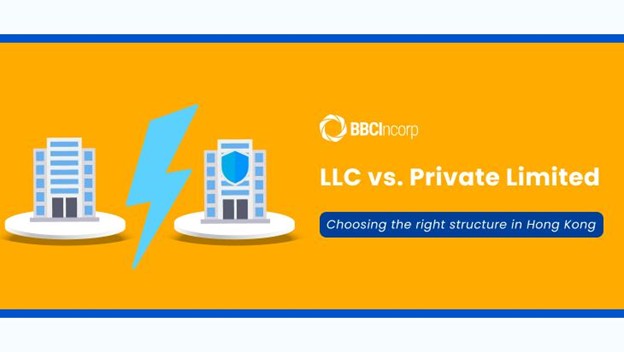LLC vs. Private Limited: Choosing the Right Structure in Hong Kong

Hong Kong’s pro-business environment and straightforward incorporation process make it one of Asia’s top destinations for entrepreneurs. However, before launching a business, selecting the appropriate legal structure is critical. The two most relevant choices are the Limited Liability Company (LLC) and the Private Limited Company (Ltd).
While both offer liability protection and legal recognition, their purposes, tax treatment, and operational frameworks vary. This article compares LLC vs. Private Limited to help entrepreneurs choose the one that best fits their commercial objectives.
Overview of LLCs and Private Limited Companies in Hong Kong
Before diving into technical comparisons, it’s important to understand how these two structures function in Hong Kong’s legal framework. Although both are registered entities under the Companies Ordinance, they serve different purposes and suit different kinds of organizations.
What is a Limited Liability Company (LLC) in Hong Kong?
Hong Kong LLC (Limited liability company) typically refers to a company limited by shares, the most common business structure for both local and foreign entrepreneurs. This structure offers limited liability protection, meaning the personal assets of shareholders are safeguarded—shareholders are only liable for the company’s debts up to the amount unpaid on their shares.
A Hong Kong LLC in this context is a separate legal entity from its owners. It can own property, enter into contracts, and sue or be sued independently. Ownership is divided into shares, which can be transferred (with restrictions, depending on the articles of association).
This type of company can be private or public, but for small to medium businesses in Hong Kong, the LLC is almost always privately held.
Understanding Private Limited Companies in Hong Kong
A Private Limited Company is a specific type of Limited Liability Company, formally known under the Companies Ordinance (Cap. 622) as a private company limited by shares. It’s the default and most popular vehicle for doing business in Hong Kong.
A Private Limited Company in Hong Kong must meet certain conditions:
- It cannot have more than 50 shareholders
- Its shares cannot be offered to the public
- It restricts the transfer of its shares
This structure is favored for its corporate credibility, tax benefits, and strong regulatory standing. It is also required to maintain statutory records, file annual returns, and prepare audited financial statements—ensuring transparency and compliance.
Key Differences Between LLC and Private Limited Company
Now that the basic roles of each entity are clear, the next step is to evaluate how they compare in practice. From liability and tax implications to setup requirements and governance, each element should be weighed against the business’s specific needs.
Legal liability and asset protection
Both structures provide a degree of personal asset protection. Members of an LLC are only responsible for the limited guarantee they pledged—typically a symbolic amount like HKD 10. Shareholders of a Private Ltd are similarly protected, liable only for unpaid shares.
In practice, however, Private Ltds tend to offer broader recognition and legal protection for commercial activities. Banks, clients, and investors typically favor this structure due to its legal clarity and wide application in for-profit ventures.
Taxation under Hong Kong’s system
Tax efficiency is often a major driver in structure selection. Hong Kong applies a two-tiered profits tax regime to both types of companies:
- The first HKD 2 million in profits is taxed at 8.25%
- Remaining profits are taxed at 16.5%
Private Ltds are treated as corporations and benefit directly from these tiered rates. LLCs may be classified as unincorporated associations in some cases, potentially qualifying for 7.5% and 15% rates, but without the benefit of pass-through taxation as seen in jurisdictions like the U.S.
Dividends from Private Ltds are not taxed at the shareholder level, enhancing financial efficiency. LLCs, on the other hand, do not distribute profits, making tax deferral or income planning less relevant.
Formation requirements and ongoing compliance
The initial registration process for both structures is straightforward under Hong Kong’s Companies Registry. However, ongoing compliance requirements differ considerably.
Private Ltds must submit annual returns, prepare audited financial statements, hold annual general meetings, and maintain statutory registers. They are also required to appoint a local company secretary and ensure that director/shareholder information remains up to date.
LLCs enjoy more internal flexibility, especially when operating at a small scale. While still subject to annual reporting and potential audit obligations, their governance can be more informal. This often makes them more manageable for non-commercial organizations.
Governance structures and operational flexibility
The two structures also differ in terms of management and internal control. Private Ltds operate under the Companies Ordinance with formalized roles for directors, shareholders, and secretaries. Their actions must be documented, and decisions are often governed by resolutions and board meetings.
LLCs rely on their founding documents and may function without appointed directors. They can adopt more adaptable governance models, which can benefit associations or collectives. However, such flexibility may be less appealing to investors or external stakeholders who seek standardized corporate behavior.
Pros and Cons of LLC and Private Limited Structures
When choosing between an LLC and a Private Limited Company in Hong Kong, it’s essential to weigh their respective advantages and limitations.
Advantages of an LLC
- Management flexibility: LLCs can be managed by members or managers, depending on the internal structure.
- Simplified ownership setup: Ideal for freelancers, consultants, or joint ventures where formal governance is not a priority.
- Lower costs at early stages: LLCs formed with minimal requirements may offer cost savings in the initial phase.
- Adaptable structure: Easier to reconfigure without the rigid shareholder restrictions that come with PLCs.
However, keep in mind that in Hong Kong, most LLCs operate in the form of Private Limited Companies by default—meaning many of these theoretical advantages will not apply in practice unless the business takes a more unconventional form.
Advantages of a Private Limited Company
- Professional image: Operating as a PLC signals that your company is serious, structured, and reliable.
- Separate legal identity: Shareholders’ liability is limited to their share capital, offering personal asset protection.
- Access to capital: PLCs can raise funds more easily through share issuance or institutional investment.
- Long-term scalability: The structure supports business growth, team expansion, and even international ventures.
- Corporate governance: Well-defined roles and procedures improve internal accountability and reduce legal risk.
For entrepreneurs with growth ambitions or external stakeholders, a Private Limited Company is often the go-to structure in Hong Kong.
Common Limitations of Each Structure
LLC limitations:
- May lack investor appeal if not registered as a Private Limited Company
- Vague terminology can cause confusion during international dealings
PLC limitations:
- Higher compliance burden: More documentation, annual audits, and filings
- Restricted share transfers: Flexibility is sacrificed in favor of ownership control
Ultimately, while the Private Limited Company offers structure and recognition, it demands more effort in compliance and reporting—something not all entrepreneurs are ready for in early stages.
Choosing the Right Structure Based on Your Business Needs
There is no one-size-fits-all structure. The best option depends on your operational goals, scale, and long-term vision.
For Startups and Small Teams
If you’re launching a small business with limited capital and low risk, forming a company under the LLC concept may be sufficient. You’ll benefit from:
- A simpler formation process
- Fewer restrictions on internal decision-making
- Lower initial setup and maintenance costs
That said, in Hong Kong, this still generally means forming a Private Limited Company, but you can manage it with minimal governance complexity in the early stages.
For Growing or Investor-Ready Companies
If you’re aiming to:
- Scale operations
- Attract investors
- Hire employees
- Build a long-term corporate presence
…then a Private Limited Company is the clear choice. It offers the right legal and financial structure to support:
- Cross-border transactions
- Capital raising
- Corporate governance standards expected by partners and regulators
Even if you’re just starting out, it may be worth choosing a PLC from day one if you plan to grow quickly.
Why Choose BBCIncorp for Hong Kong Company Formation
Regardless of whether you choose an LLC or a Private Limited Company, the incorporation process in Hong Kong requires accuracy and adherence to local regulations. BBCIncorp is a well-established service provider that supports both entity types, offering end-to-end solutions designed to simplify business setup and ongoing compliance.
Their services typically include:
- Tailored company incorporation support
- Assistance with appointing local directors, secretaries, and providing a registered address
- Preparation of key documents such as the company constitution, statutory registers, and annual returns
- Ongoing compliance support, including audits, renewals, and regulatory filings
With strong experience in Hong Kong corporate services, BBCIncorp is frequently chosen by entrepreneurs seeking a reliable partner for incorporation and compliance.
Choosing between LLC vs. Private Limited Company in Hong Kong depends on your business goals. While both offer limited liability and a separate legal identity, a Private Limited Company is ideal for businesses aiming to scale and attract investors, whereas the LLC structure suits smaller, flexible operations.
Making the right choice early helps avoid future restructuring and ensures compliance. For those exploring setup options, BBCIncorp provides useful guidance and incorporation services tailored to both LLCs and Private Limited Companies in Hong Kong. Visit their website to learn more about structuring your business effectively.
Contact information:
Organization: BBCIncorp
Website URL: https://bbcincorp.com/
Email: service@bbcincorp.com
BBCIncorp’s Headquarters in Hong Kong:
Address in Hong Kong: Office 3906, 39th, The Center, 99 Queen’s Road Central, Central, Hong Kong
Phone in Hong Kong: (+852) 9889 3529
BBCIncorp’s Office in Singapore:
Address in Singapore: 9 Raffles Place, #29-05 Republic Plaza, Singapore (048619)
Phone in Singapore: (+65) 6011 8200
BBCIncorp’s Office in Vietnam:
Address in Vietnam: 39-41 Ngo Thi Bi Street, Him Lam Area, Tan Hung Ward, Ho Chi Minh City
Phone in Vietnam: 18006338


